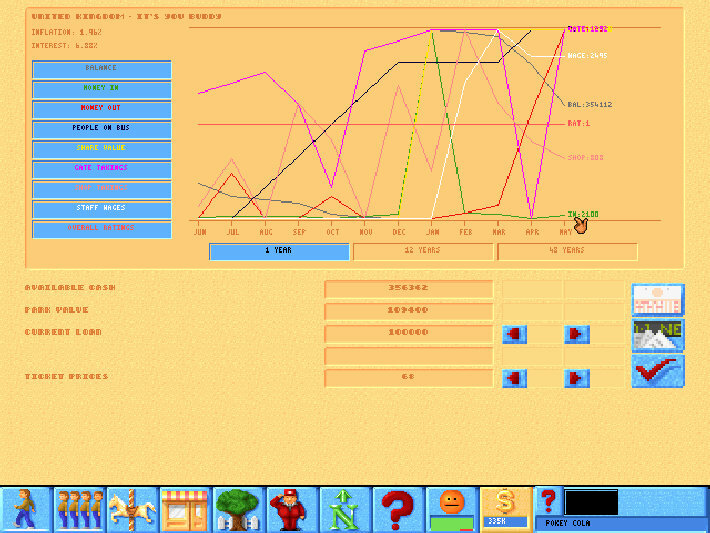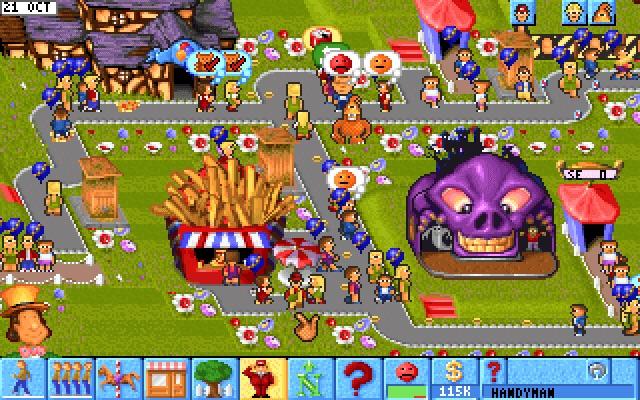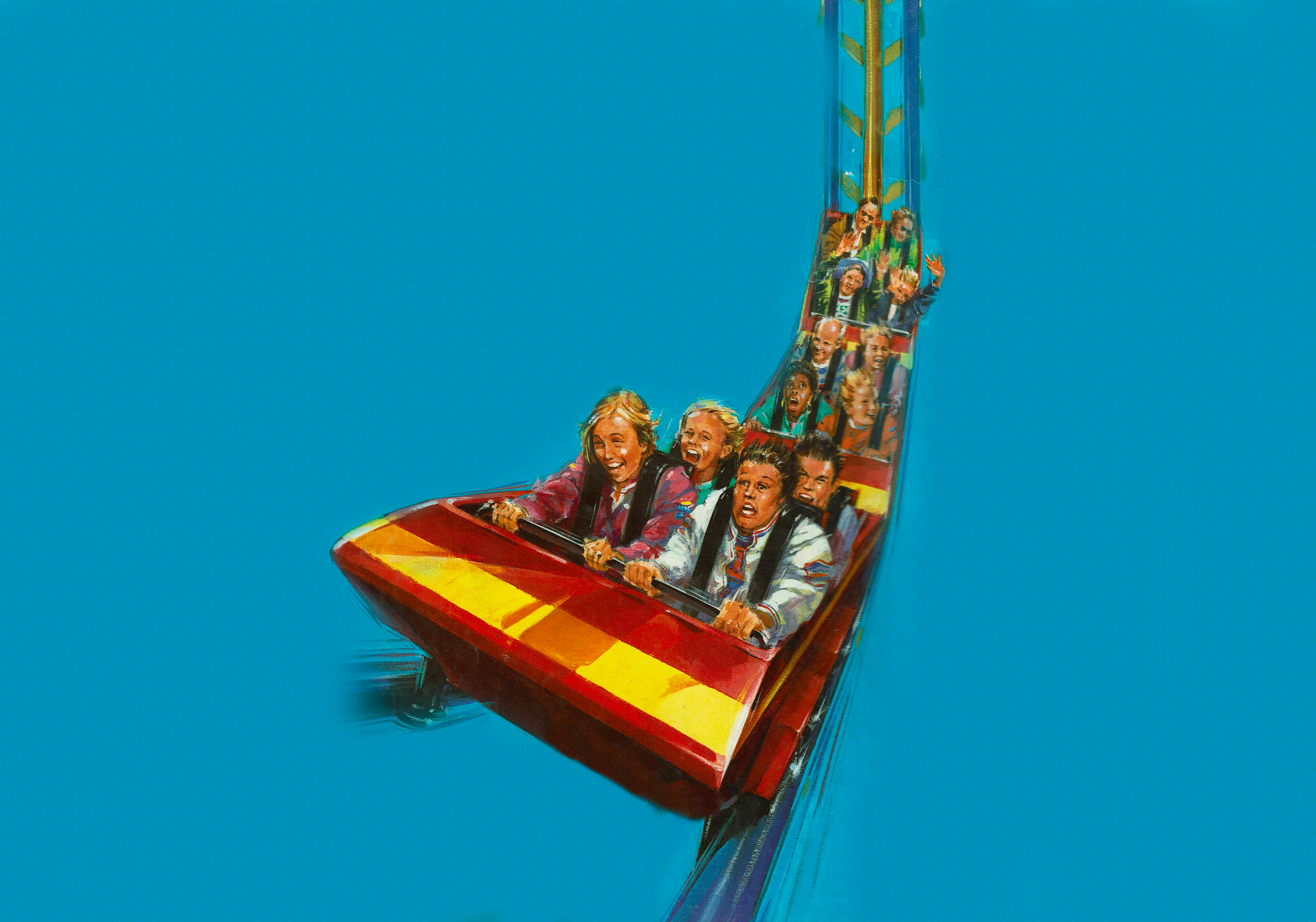Rather than riding the wave of arcade and action that dominated fourth-generation consoles, Theme Park (1994) followed the popularity of SimCity (1989) into the world of building simulation–with an added layer of business economics–that can lead to hours of frustratingly addictive fun for both the player and its park visitors.

Theme Park was originally released for 3DO, Commodore Amiga, DOS, and Macintosh. There are too many subsequent ports to list, but the game quickly became quite popular among most consoles of the time.^1 Bullfrog Productions handled the development, and Electronic Arts published the initial releases in 1994. By this point, there had been enough success stories of more simulation, puzzle-based narratives from Myst (1993), and the aforementioned SimCity to prove that non-action titles could profit in the general market. Even with this reassurance, though, Theme Park seemingly was not ready to go all-in on a specific market of gamers, and the game allows for three levels of difficulty. Without such options, some of the gameplay’s more managerial mechanics would overwhelm and confuse a lot of players. Hence, you can customize the type of simulation, difficulty, and opponent frequency. This demonstrates a self-awareness on the part of Bullfrog, along with demonstrating a shift to enabling more laidback forms of gameplay. Nevertheless, having the easier, sandbox modes as the only option would flatten a lot of the main programmer’s vision for the business genre. To this end, a standout feature of the more difficult build of the game is Peter Molyneux’s affinity for the world of entrepreneurship and business, wherein the player takes on some of the intricate financial management required to run a theme park.^2 For the purposes of this review, I will jump between difficulties and experiences, but the broad themes I discuss are relevant to the entire player experience regardless of what route they take.

Rather than just starting out in a new plot of land, the first step in the game is to actually buy the piece of land in which you will be building. This sets the stage for the level of detail that the game will deploy for the entire rest of the gameplay. Immediately the game’s cartoony and vibrant graphics–along with the Willy Wonka-esque guide that will assist you with tips–evoke a sense of joy as you navigate through the bottom UI. Despite its narrative difficulty, the mechanics are fairly straightforward through point-and-click. Per its immersion, Theme Park not only provides various tools to build passageways, rides, shops, and stores, but it also gives immense control of each attraction and its effects on the park’s visitors. Indeed, you have the power to adjust ticket prices, ride capacity and speed, and food stock. These tasks, among various others, culminate throughout the in-game year into the success or failure of your park. It is both a simulation of building as it is of business management.

There is a fairly steep learning curve to this latter aspect of financial responsibility, and it is not until you are able to make a profitable enough park that other locations and attractions are available. The better your park, the more options you ultimately get to create even better attractions. At its most difficult, there is a significant amount (at least relative to most other simulation games) of financing and business knowledge that the player is required to employ, as the game requires you to keep track of the world’s stocks and overall economic management. Despite its lack of action and violence, this layer of gameplay is actually what makes Theme Park difficult when compared to its sandbox levels that minimize the business mechanics. You are in charge of the fun, but most importantly, you are in charge of funding it.
Despite all of the opportunities to micromanage the theme park, Theme Park still leaves you at the mercy of the nonplayer characters (NPCs) park visitors or what the game manual calls “little people.” The happiness of each person is critical to the overall success of the park, and you are able to click on every single person that visits. Big picture-wise, the birds-eye view of the game enables easy spotting of traffic patterns and recurring speech bubbles that highlight the needs of visitors. In turn, the mechanics reach a neat in-between of detail and breadth. The economy is powered by individual needs, but sometimes it is best to think in terms of overall crowd work. The NPC staff aid in caring for the park, and the more handymen and mechanics hired the better chance rides will remain active and the park clean. However, it is not uncommon for both the staff and the little people to become unruly, and particularly when in business mode, it is difficult to keep track of the surging crowds and issues to take care of. I take this to be a specific narrative on the limits of managing positions, in which the individual agency of people can ultimately triumph.
With Theme Park inching towards its 30th anniversary, it is sometimes hard to distinguish whether some of these game mechanics may be narratives on business management or simply the game reaching its technological limitations. Most notably, it is often hard to diagnose exactly why visitors are unhappy beyond their speech bubble statements. In the first few hours of gameplay, you will most likely wonder why little people keep saying they’re hungry and thirsty when food and beverage stands are both available. As I did above, some could take this to be a commentary on the way higher management struggles to truly aid their customers’ needs despite complaints. However, it would also be fair to say that Theme Park’s level of immersion demands too much of its player and NPCs, as analyzing routes, the proximity of attractions, and minute patterns may be incredibly impressive but it quickly devolves into confusing and frustrating gameplay.

Thus, at its worst, Theme Park makes you feel like a poor businessman left to see a park full of vomiting, sad little people. But at its best, Theme Park is an addictive ride that leans into the very best of what future tycoon simulation games would go on to perfect.
^1: https://www.mobygames.com/game/dos/theme-park/promo/promoImageId,476145/
^2: https://www.pcgamesn.com/theme-hospital/theme-hospital-peter-molyneux-making-of

